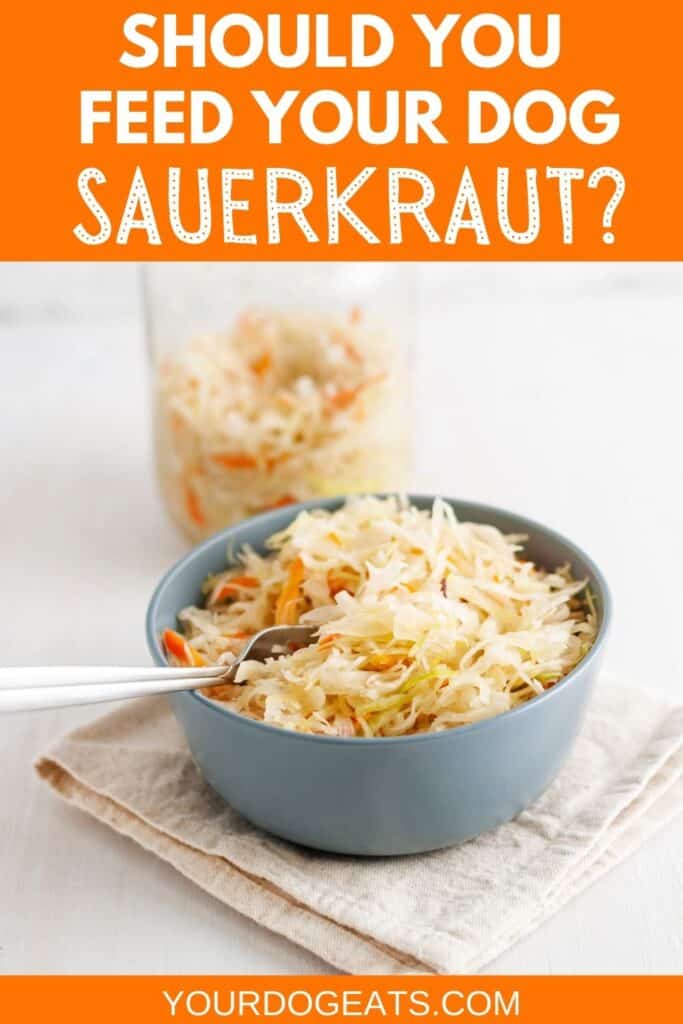Getting ready to load up a hot dog with sauerkraut, only to find your dog snagged the kraut first? If you’ve found yourself now wondering “can dogs eat sauerkraut?!”, rest assured – yes, it is safe for a dog to eat it in small amounts. In fact, traditional sauerkraut may actually offer up some beneficial probiotics.
This post was reviewed for veterinary accuracy by Cara Wright, DVM. For more information about our review process and Cara, please visit the About Us page.
Sauerkraut and a dog’s health
You may be surprised to hear that not only can dogs eat sauerkraut, but eating a traditionally fermented sauerkraut may be beneficial to their health.
Traditional sauerkraut is made by sprinkling salt over shredded cabbage, mixing it together so that the cabbage releases some juices, then packing it down into a jar with its own brine. It’s left to continue to ferment at room temperature until ready to enjoy, or move to cold storage.
Because of this natural fermentation process, traditional sauerkraut is rich in probiotics.
These probiotics may help improve gut health in your pet. That’s right, your canine companion has a complex gut microbiome, similar to how we do as humans.
And just like how certain foods contain prebiotics to feed your dog’s gut bacteria, foods like kraut with probiotics may offer additional beneficial bacteria strains that can stick around the gut.
According to a study in the journal Anaerobe, these probiotics may offer benefits for dogs like supporting the immune system, assisting with stress management, protecting or helping with certain gastrointestinal infections, improving allergy disorders, and possibly even helping with weight control (source).
Note that much of this research is evolving, and often focuses on supplements. But theoretically the probiotics in a food like sauerkraut could be beneficial in appropriate small amounts.
What about the salt?
Salt is a key ingredient in making sauerkraut. Keep in mind, too much sodium is not ideal for your dog.
That said, it’s pretty rare to see true hypernatremia – excessive blood sodium levels – in dogs. Usually this connected with severe fluid losses, rather than eating salty foods. It can happen though if a dog eats a ton of cooking salt, rock salt, homemade playdough, or any other extreme source of sodium.
If you have a small dog that got into a ton of salty jarred sauerkraut, it may be worthwhile to keep an eye on them. Signs of too much salt intake in mild cases are usually gastrointestinal upset (like vomiting or diarrhea). In severe cases, it can include depression, tense muscles, lethargy, frequent urination, or seizures.
Your pup would have to eat a lot of sauerkraut for immediate sodium concerns, though.
For example, a 14 ounce can of Frank’s sauerkraut contains 1,980 mg of sodium in the entire can – or about 1.9 grams. According to the textbook Small Animal Toxicology, signs of salt poisoning can occur as low as 2 grams (2.2 kilograms). So if you had a small puppy from a small dog breed, and they somehow managed to eat an entire can of sauerkraut – that would be reason to be concerned.
This scenario would be fairly unlikely, but still – it’s wise not to give your dog too many salty foods.

Is homemade or store-bought sauerkraut better?
Generally, homemade or locally purchased is a better option, as it is traditionally fermented.
Many products at the grocery store are shelf stable. These are usually pasteurized which would kill off many of the good bacteria. Some of these are also pickled with vinegar rather than utilizing the traditional lacto-fermentation process. As such, they don’t have nearly as many probiotics.
You can still find traditionally fermented kraut at the supermarket though, which would contain the probiotics. Scope out the refrigerated sections rather than the inner aisles, and look for the only ingredients to be cabbage, salt, and water.
Homemade versions also generally have less overall sodium compared to those at the grocery store, but it’s always worth comparing labels on products and recipes you’re planning to use so you can make the best choice.
Be careful with added ingredients
A basic sauerkraut is generally just cabbage, salt, and water. Many brands and home cooks will add additional flavorings to their kraut, though. When it comes to the question of “can dogs eat sauerkraut”, here are a few ingredients that should be avoided:
- Caraway seeds
- Onions and onion powder
- Garlic and garlic powder
- Raisins
These are all toxic to dogs.
Think twice about heating
Some people love warm sauerkraut, but you’ll want to be careful about how high you heat it. Similar to the pasteurization process for those shelf-stable canned products, applying heat at home (either in a pot or in the microwave) can kill some of the beneficial bacteria in the kraut.
If you’re giving your dog a little bit to help boost their good gut bacteria, it’s better to feed it cold or slightly warm (but not hot).
As a heads up, warming it up may also accentuate the pungent smell, which could turn your dog off to eating it.
Letting your dog try it
Some dogs may not want to try sauerkraut, thanks to it’s strong smell. If you’d like your dog to give it a try, you can mix it into their dog dish with a protein-rich food with a strong smell, like boneless fish or certain commercial dog foods.
Another option is to mix it with a warm cooked food like apples, which will add sweetness and mellow the tangy taste of the kraut.
Remember though that your dog’s diet should be carefully balanced, so don’t focus on giving too much of any one table food option, as it can displace the other key protein-rich choices they need.
A Final Word from Your Dog Eats
Though a few bites of sauerkraut should be safe (and possibly even beneficial) for most dogs, it’s always worth calling your veterinarian if you’re concerned about your dog’s health. This information is for general purposes only and you should always seek individualized advice if you have additional questions or concerns.


